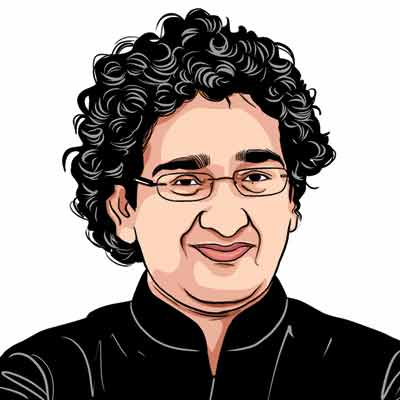Opinion Mahabharata,without the Gita
No,it holds a mirror to what our politics has become....
In April 2009,Prakash Jha,filmmaker and Lok Janshakti Party candidate from West Champaran (Bihar),was arrested. The police had raided his hotel,seized the Rs 10 lakh they found,and accused Jha of bribing voters. The tables had turned on the director of exposés such as Apaharan and Gangajal. Jha eventually lost the election,as he had in 2004. But as his latest film shows,he seems to have gained a feel for the texture of Indian democracy.
Raajneeti owes its plot to two epics: The first is Mahabharata,with its intra-clan rivalry for the Hastinapur throne. A more recent inspiration is Francis Ford Coppolas The Godfather,with its focus on a young Michael Corleones ascendancy from principled outsider to consummate Mafia insider. Both these narratives pan out in the heat of Hindi heartland politics. The Prataps an alliance of families united by marriage and lust for power have ruled this unnamed north Indian state for decades. As the patriarch lies on his death bed,the alliance breaks up. The film chronicles the resultant manoeuvrings for political power through marriage,friendship,revenge,and plenty of death.
In her acclaimed 1969 essay The Personal is Political,feminist Carol Hanische argued: One of the first things we discover in these groups [of women is that personal problems are political problems. Raajneetis message turns that idea on its head: all politics is only personal. Women marry for political expedience,men make love and death for it,aspiring female politicians sell themselves for tickets,then denounce their violators for more tickets. As the film bumbles from one revenge attack to the next reprisal,it becomes apparent that Raajneeti both the film as well as its wider practice is less about governance and representation,more about a power-addicts craving for the next high. This is Mahabharata alright,but without the Bhagawat Gita there is no moral core that confers meaning on the quest for power.
The Mahabharatas dilemmas between ethics and loyalty,right and wrong,are best captured in Karna. Abandoned by his mother and brought up in a charioteers house,Karnas downfall lies in choosing loyalty to political expediency,generosity to calculation. In his book on the Mahabharata,The Difficulty of Being Good,author Gurucharan Das finds in Karna the most complex and fascinating of characters. Other Mahabharata adaptations,such as the Tamil film Thalapathi,have as their protagonist the anti-hero Karna,crippled by loyalty and circumstance. Raajneetis Karna,Sooraj Kumar,is abandoned by a mother who subsequently marries into the ruling Pratap family. Sooraj is brought up by a Dalit driver to that very family. The dilemmas of Karna are suited to the dark,brooding Ajay Devgn whose quandary between honesty and loyalty play out in the wide-angled focus on his eyes.
Where Raajneetis Karna differs from others is in its references to Dalit politics. Sooraj declines his mothers later request to come back to his true home because: in every breathe of mine there is a Dalit. Sooraj also rebels against the stranglehold the national party has over his basti,dissing a party candidate as being from our caste,but not from our area. These tensions have historically played out in Uttar Pradesh and Bihar. Dalits in both states,long seen as reliable Congress voters,now gravitate towards regional Dalit parties. It is possibly a coincidence that one such party,Ram Vilas Paswans LJP,gave Prakash Jha a Lok Sabha ticket in the 2009 general elections.
Surinder Jodhka,a professor at Jawaharlal Nehru University who works on Dalit politics,says that explicitly Dalit characters are rare in Bollywood. Even the socially relevant films of the 60s and 70s focused on class not caste he says. Jodhka points to a few films such as Lakshya and Delhi 6,which portrayed Dalit characters. But I cant think of a single film where Dalit politics was the focus, he adds. This is a crucial distinction. In Lagaan for instance,the acceptance of the sweeper Kachra by the village cricket team has more to do with the demands of national integration than the aggressive political mobilisation of Ajay Devgns Dalit samrat character Sooraj Kumar.
But like others in the film,Sooraj Kumar is ultimately drawn to the blood-letting that winning power involves,blinded by loyalty to his political patron,rather than fidelity to his caste. It is victory at all cost,as the films trailer declares. Perhaps the only innocent in the entire film is its audience.
Universal adult franchise,in a country as poor and unequal as India,was premised on ideals,not people. The Constitution of India was penned,not just by the dominant Congress party,but by people of varied ideological,religious and sectarian hues. Its chief draftsman,B.R. Ambedkar,warned against the adulation and bhakti to which he felt the Indian public was susceptible. To further the separation of politics from personalities,the first Union Cabinet had a law minister (Ambedkar) and an industry minister who were opposed to the Congress. That spirit of accommodation was meant to convey a ruling elite grander than a solitary individual,family,ideology or party. We have since carried on with free and fair elections. But our politics is now the domain of the families,rivalries and machinations that
Raajneeti so ruthlessly captures. As we ape the rituals of democracy but ignore its rigour,have we,like the soul-less cast of Raajneeti,copied the Mahabharata but cast aside its core text?
express@expressindia.com


